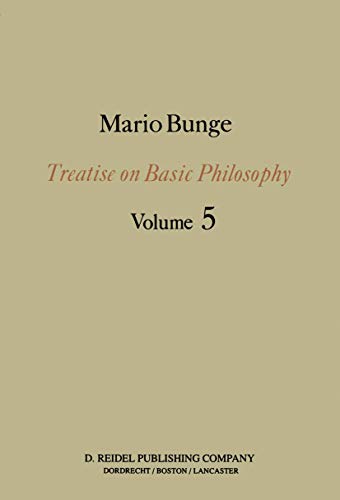
1983, ISBN: 9027715114
[EAN: 9789027715111], Neubuch, [PU: Springer Netherlands Aug 1983], EPISTEMOLOGIE; WISSENSCHAFTSPHILOSOPHIE; KNOWLEDGE; PROPOSITION; REASON; SEMANTICS; SUBJECT, This item is printed on de… Meer...
| AbeBooks.de BuchWeltWeit Ludwig Meier e.K., Bergisch Gladbach, Germany [57449362] [Rating: 4 (von 5)] NEW BOOK. Verzendingskosten:Versandkostenfrei. (EUR 0.00) Details... |

Treatise on Basic Philosophy. Volume 5. Epistemology & Methodology I: Exploring the World. - pocketboek
1983, ISBN: 9027715114
[EAN: 9789027715111], [PU: Dordrecht/Boston/Lancaster. D. Reidel.], Buchrücken minimal ausgeblichen, insgesamt sehr guter Zustand. XV, 404 Seiten, Englisch 758g, Books
| AbeBooks.de Antiquariat Bernhardt, Kassel, Germany [627145] [Rating: 5 (von 5)] Verzendingskosten: EUR 185.85 Details... |

ISBN: 9789027715111
Hard Cover. New. New Book; Fast Shipping from UK; Not signed; Not First Edition; The Epistemology & Methodology I: : Exploring the World., 6
| Biblio.co.uk |

ISBN: 9027715114
[EAN: 9789027715111], Gebraucht, wie neu, Unread book in perfect condition., Books
| AbeBooks.de GreatBookPricesUK, Castle Donington, DERBY, United Kingdom [72536976] [Rating: 5 (von 5)] NOT NEW BOOK. Verzendingskosten: EUR 536.29 Details... |

1983, ISBN: 9027715114
[EAN: 9789027715111], Neubuch, [PU: Springer], pp. 428, Books
| AbeBooks.de Books Puddle, New York, NY, U.S.A. [70780988] [Rating: 4 (von 5)] NEW BOOK. Verzendingskosten: EUR 8.26 Details... |


1983, ISBN: 9027715114
[EAN: 9789027715111], Neubuch, [PU: Springer Netherlands Aug 1983], EPISTEMOLOGIE; WISSENSCHAFTSPHILOSOPHIE; KNOWLEDGE; PROPOSITION; REASON; SEMANTICS; SUBJECT, This item is printed on de… Meer...

bij AbeBooks.de
Bunge, Mario:
Treatise on Basic Philosophy. Volume 5. Epistemology & Methodology I: Exploring the World. - pocketboek1983, ISBN: 9027715114
[EAN: 9789027715111], [PU: Dordrecht/Boston/Lancaster. D. Reidel.], Buchrücken minimal ausgeblichen, insgesamt sehr guter Zustand. XV, 404 Seiten, Englisch 758g, Books
ISBN: 9789027715111
Hard Cover. New. New Book; Fast Shipping from UK; Not signed; Not First Edition; The Epistemology & Methodology I: : Exploring the World., 6

bij AbeBooks.de
ISBN: 9027715114
[EAN: 9789027715111], Gebraucht, wie neu, Unread book in perfect condition., Books

1983, ISBN: 9027715114
[EAN: 9789027715111], Neubuch, [PU: Springer], pp. 428, Books
Bibliografische gegevens van het best passende boek
| auteur: | |
| Titel: | |
| ISBN: |
Gedetalleerde informatie over het boek. - Epistemology & Methodology I:: Exploring the World: 5 (Treatise on Basic Philosophy, 5)
EAN (ISBN-13): 9789027715111
ISBN (ISBN-10): 9027715114
Gebonden uitgave
pocket book
Verschijningsjaar: 1983
Uitgever: Springer
428 Bladzijden
Gewicht: 0,801 kg
Taal: eng/Englisch
Boek bevindt zich in het datenbestand sinds 2007-02-19T21:04:22+01:00 (Amsterdam)
Detailpagina laatst gewijzigd op 2024-03-08T07:54:16+01:00 (Amsterdam)
ISBN/EAN: 9027715114
ISBN - alternatieve schrijfwijzen:
90-277-1511-4, 978-90-277-1511-1
alternatieve schrijfwijzen en verwante zoekwoorden:
Auteur van het boek: mario bunge, mario bung
Titel van het boek: treatise basic philosophy volume, epistemology methodology, treatises, exploring philosophy
Gegevens van de uitgever
Auteur: M. Bunge
Titel: Treatise on Basic Philosophy; Epistemology & Methodology I: - Exploring the World
Uitgeverij: Springer; Springer Netherland
404 Bladzijden
Verschijningsjaar: 1983-08-31
Dordrecht; NL
Taal: Engels
106,99 € (DE)
109,99 € (AT)
118,00 CHF (CH)
Available
XIX, 404 p.
BB; Hardcover, Softcover / Philosophie/Allgemeines, Lexika; Wissenschaftsphilosophie und -theorie; Verstehen; epistemology; knowledge; proposition; reason; semantics; subject; Philosophy of Science; Epistemology; Philosophie: Epistemologie und Erkenntnistheorie; BC; EA
of Epistemology I.- I. Cognition and Communication.- 1. Cognition.- 2. Knowledge.- 3. Communication.- II. Perceiving and Thinking.- 4. Perceiving.- 5. Conceiving.- 6. Inferring.- III. Exploring and Theorizing.- 7. Exploring.- 8. Conjecturing.- 9. Systematizing.- Appendices.- 1. The Power of Mathematics in Theory Construction: A Simple Model of Evolution.- 2. The Prose Identifying the Variables.- Index of Names.- Index of Subjects.Andere boeken die eventueel grote overeenkomsten met dit boek kunnen hebben:
Laatste soortgelijke boek:
9789400970274 Epistemology & Methodology I: (M. Bunge)
- 9789400970274 Epistemology & Methodology I: (M. Bunge)
- 9789027715234 Epistemology & Methodology I:: Exploring the World: 5 (Treatise on Basic Philosophy, 5) (Bunge, M.)
- 9789027716347 [ TREATISE ON BASIC PHILOSOPHY: VOLUME 6: EPISTEMOLOGY & METHODOLOGY II: UNDERSTANDING THE WORLD (1983) (TREATISE ON BASIC PHILOSOPHY #6) ] By Bunge, Mario ( Author ) ( 1983 ) { Hardcover } (Mario Bunge)
< naar Archief...

